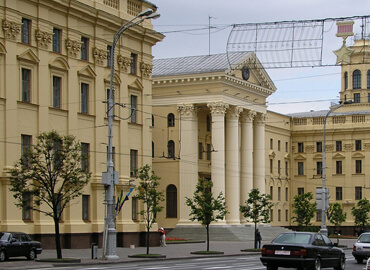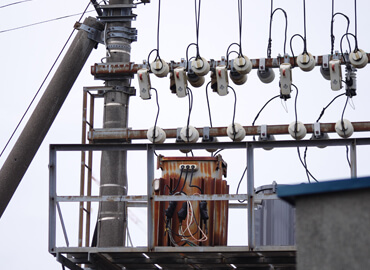Main topics and directions of propaganda in March 2024:
Belarus
- Soviet holidays and nostalgia for the USSR are an additional measure for ideological strengthening of the regime. The authorities used International Women’s Day on March 8 not to encourage the fight for women’s rights, but to bolster Lukashenka’s standing.
- The theme of “genocide of the Belarusian people” during World War II continues to be used in anti-Western rhetoric, but the first victims of the campaign are in Belarus.
- Once again, at the highest level, intentions were announced to begin discussing the foundations of “state ideology.”
- The Union State media holding received its first major funding.
Belarusian democratic forces
- Supporters of democratic transition are still the number-one target for Lukashenka’s propaganda.
- The “speaker” for the regime stated at the UN that there are “no political prisoners” in Belarus.
- According to an official from the “presidential” administration, “information warfare” is “task number one for 2024.” “Bloggers” and “online-ers” are a threat to the regime.
- Propaganda outlets continue to threaten the people with “military training camps” for political emigrants to attack Belarus.
Russia
- The Belarusian regime is delighted with the results of the “elections” for “president” held in Russia. Lukashenka said, “There is a lot to learn.”
- Raids of Russian paramilitary units fighting on the Ukrainian side in the Belgorod region were conducted. The goal of propaganda outlets is to show that the attacks have achieved the opposite goal of having Russian society rallied even more around the “president.”
- State media in Belarus accused Ukraine of “terrorism” for attacks on Russian oil refineries.
- The terrorist attack at Crocus City Hall, in line with Kremlin propaganda, was blamed by Belarusian media on Ukraine and the West.
Ukraine
- Hostile rhetoric towards Ukraine persists, however, fewer and fewer statements by propagandists on the subject of Ukraine are recorded each month.
- Propaganda media could not ignore the 10th anniversary of the seizure of Crimea. However, there are much fewer statements made on this topic in Belarus than in Russia.
The “collective West”
- The “Oshmyany Declaration.”: A new surge of threats. The main topics for discussion in propaganda media included the following:
— Statements by Emmanuel Macron about the possibility of sending troops to Ukraine
— Sweden’s accession to NATO
— Moldova and Gagauzia
BELARUS
Soviet holidays and nostalgia for the past
The Belarusian regime continues to cultivate nostalgia for the USSR as a measure of social unity. An important role in this “rally around the past” is played by Soviet holidays, which have survived to this day almost unchanged.
On March 8, International Women’s Day was widely celebrated in Belarus. The “Sovietness” of this holiday is expressed in the fact that it is celebrated not so much to remind society of the struggle for women’s rights, but rather to reinforce traditional ideas about their “purpose.”
Like other holidays, March 8 is used by propaganda outlets to increase the rating of “president” Aliaksandr Lukashenka. A special term was even coined for him – the “women’s president.”
In the first half of March, Lukashenka met with women’s groups throughout the country. His speeches, as well as statements made by propagandists – male and female – during this period, sometimes contained hints that in other societies would be seen as manifestations of misogyny and discrimination.
For example, on March 5, meeting with the leadership of the pro-government Belarusian Women’s Union, Lukashenka said that “the true purpose of a woman on earth is motherhood” and “all that talk about gender inequality is irrelevant”:
“No matter what pink, multi-colored or others there are in the West (this wave may already be moving towards us, unfortunately), no one except for a woman can give birth to a real successor for us. A woman and mother is the keeper of not only the family hearth, but also the traditional foundations of our society. By raising children to be patriots, you strengthen the state and lay a reliable foundation for the future of our Belarus. Therefore, give birth, raise and take care of our children, and we will try – we are obligated – to provide you with peace and prosperity” (March 5, BelTA).
At this same meeting with the Belarusian Women’s Union, Lukashenka raised the issue of building a party for women:
“Preparing for this meeting, I thought, ‘Why haven’t you become a party yet?’ It seems to me that if we had a women’s party, it would simply have no rivals.”
The answer to this proposal came just in one day. On March 7, in an interview with the pro-government newspaper Belarus Segodnya, the head of the Belarusian Women’s Union, Volha Shpileuskaya, said that activists would “consider” creating a women’s party, and at the same time referred to Lukashenka:
“As the head of state said, everything must come from within, from below. Therefore, we will discuss, gather together our women’s group and make a decision.”
In addition, Shpileuskaya shared her understanding of women’s rights, which is typical for an unfree society with a dictatorial (patriarchal) form of government:
“Olga Alexandrovna, you stand for gender equality in our society. Do you think maybe our rights should not be shared with men?”
“Some rights definitely should not be shared with men. For example, the right to bear and give birth to children… Moreover, our country maintains traditional values. The role of a woman is exclusively her role and right to be a woman in the family. We need to adhere to the traditions laid down by previous generations.”
It seemed that propagandists were competing to propagate patriarchal stereotypes. They emphasized women’s dependence on men (specifically on one man, the “women’s president”) and bitterly criticized the fight for their rights.
Grigory Azarenok:
“Feminism in the West makes women into terrible, evil, vile, despicable creatures. We have always had and always will have an atmosphere of complete love and respect for them… And on March 8th we do not have suffragettes and other witches of the early 20th godless century, but have flowers, love, and devotion. And Bat’ka, of course, is a women’s President.” (March 5, personal Telegram channel)
A column by “human rights activist” Alena Krasovskaya, published on the eve of March 8, can, with good reason, be considered an example of the “abolition” of women’s rights:
“So what if the share of women in parliaments around the world has reached 26.9%? The whole world is already so fed up with constant reminders about gender equality that in many countries, to be rid of them, they simply established quotas for women and men. And in the same parliaments they take whoever they get, as long as their documents show that they are women. This unprepared ballast sits in parliament, just taking up space – and there is no sense in it.
It’s also good if it sits silently. Some, having entered parliament or having received some significant post, begin to take the wheel or make decisions. What comes out of this? Ursula Von der Leyens is a prime example of this. Not the most successful former gynecologist, who became the head of the European Commission, has been, out of habit, sending for five years now the entire EU to the place where she used to work. But the excitement over the fact that the EC is headed by a woman never goes away.” (March 7, Belarus Segodnya).
“In a country that has Bat’ka, it is easy to be a mother. In a country that has Lukashenka, you want to be a woman,” says propagandist Yauhen Pustavoy. His article “They won’t give up their Favorite! What the women’s President has promised in a heart-to-heart conversation with Belarusians” is an example of how any holiday becomes just an excuse to once again praise Lukashenka:
“The enemies of humanity know where to hit—right in ‘the apple.’ A new apple from the serpent of modern Eve – a breakdown of genders, feminism, childfree – all so that a woman is left alone. But this is not Belarus. It is there, in Europe, that the political elite is infatuated with this. We have a gallant President of the continent… Belarus is a territory of courage and [it is] also a country where femininity is protected… In a country where there is Bat’ka, it is easy to be a mother and in a country where there is Lukashenka, you want to be a woman.” (March 7, 2024, newspaper Minskaya Pravda)
On the same day, Pustovoy, speaking with the host of the talk show The Hidden Springs of Politics on the channel STV, Grigory Azarenok, developed his idea further:
“If Nuland [U.S. Deputy Secretary of State] or Ursula von der Leyen [Chair of the European Commission] saw a person like Lukashenka next to her, she would become a normal woman. She would be like ‘here he is!’ The protector who solves all problems. She would relax and discover something good in herself. Their problem is a lack of normal men… Belarus opened up because it found itself in the hands of our President – a real man.”
On March 7, the state television channel MIR aired a program called “The Women’s President.” In footage where, in the spirit of propaganda films about North Korea, crying women strive to hug Lukashenka, the voice of the announcer says, “Aliaksandr Lukashenka calls caring for the fair half of humanity the priority of priorities, and calls himself the women’s President.”
Following this, in the words of the young editor Vitalina Petrusevich of the television channel Belarus 4-Mogilev on Grigory Azarenok’s channel, one can hear hopelessness and the absence of any hope for change. It is not clear whether Vitalina limits her life path to only 46 years, or whether she is hinting that everything has its limit – even Lukashenko’s presidential term:
“I’m 23. I was born under the President. I have lived under him, I live under him, and I want to continue to live under him for at least as long. Aliaksandr Grigorievich will not give us up. Because he is a man. We women will always be for him.” (March 8, channel Azarenok – Direct)
At the same time, thousands of women have been persecuted for their views over the past four years. According to a review by the Human Rights Center Viasna, published on March 8, 2024, more than 170 women political prisoners continue to be held in prisons in Belarus alone. Of these, at least nine were journalists convicted for their professional activities. Lukashenka’s propagandists often publicly ridicule, insult, and humiliate participants of democratic protests.
***
Another example of the romanticization of the memory of the USSR was the Day of Internal Troops of the Ministry of Internal Affairs in March. It was these troops that were most actively involved in the brutal suppression of peaceful protests in August 2020. Propagandist Grigory Azarenok on his channel puts them on par with Stalin’s NKVD troops, who destroyed “enemies of the people” in the USSR:
“NKVD troops. How much horror they brought to the trembling enemies of the people. And how much delight and joy, how many noble feelings they aroused in the true patriots of the Fatherland. It was they who stood up for the President at a time when it was necessary to restore brutal order and save the people from the rule and lawlessness of bandits.” (personal Telegram channel, March 17)
The same elements of glorifying the USSR (and at the same time intimidating society) were included in the news that the lyceum of the country’s main university, the Belarusian State University, will be named after Felix Dzerzhinsky. The lyceum employees themselves asked that it be named after the “outstanding native of the Belarusian land” (and the creator of the All-Union Emergency Commission – the first punitive body of Bolshevik Russia). Propagandist and “Eurasianist” Alexey Dzermant commented the following on this:
“By the one who wrinkles his delicate nose at this news, one can judge who is contra [“counter-revolutionaries”] and who is not. Felix Edmundovich [Dzerzhinsky] is a good example of how representatives of all local cultures accepted the service of the Red project. I hope that one day we will wake up and learn of a decision to erect a monument to Joseph Vissarinovich [Stalin] in Minsk.” (March 16, personal Telegram channel)
The instilling of nostalgia for the Soviet system is also manifested in everyday propaganda activities. If there is a need to fight back against the International Olympic Committee, which has banned athletes from Russia and Belarus from competing under national symbols, then the symbols of the USSR come to the rescue. Yuri Uvarov, newspaper Minskaya Pravda:
“For several years now, people have been saying that if a decision is made on participation [of Russia and Belarus in the Olympic Games], then let’s have our athletes compete under the flag of the Soviet Union. Nobody has banned Soviet symbols. And this will be a worthy response to all the machinations of Western enemies.” (March 19)
Praise and flattering speeches addressed to Lukashenka are heard not only on holidays. The creation and maintenance of a cult of personality takes place 24/7 – with or without a reason or excuse. The streams of propagandist Grigory Azarenok are characterized by particularly aggressive sycophancy. Every invited guest is simply obligated to praise the “president” at least once in their speech. For example, the head of the Belarusian Republican Youth Union, Aliaksandr Lukyanov, speaking on Azarenok’s program on March 13, said that he connects the future of Belarus only with Lukashenka.
“We live in a paradigm of the future, and the future is Bat’ka. That’s what young people think! Look how Lukashenka treats people, young people. So many new and interesting things. And the West is a corpse. There is not a single new philosophical thought. There’s not a single new idea there.»
“Genocide of the Belarusian people” in World War II
The Belarusian regime continues to employ the manufactured topic of “genocide of the Belarusian people” to strengthen anti-Western rhetoric. However, the first victim of the anti-Western “genocidal” campaign appeared within the country. At the beginning of March 2024, it became known that a 54-year-old resident of Minsk was arrested under an article of Belarus’s Criminal Code for “denial of the genocide of Belarusians.” According to the court decision, in 2020 he allegedly created and administrated a group on a social network where he posted some “information discrediting the republic and exonerating fascists.” The Belarusian service of Radio Liberty clarifies that criminal cases had already been initiated earlier under the article on denial of genocide. In particular, in January, a case was opened against one of the authors of Radio Liberty, Sergei Dubovets.
Plans for the development of state ideology
On March 15, the Belarusian propagandist and director of the National Library who is under sanctions of the European Union and other countries, Vadzim Hihin, made a statement in which he proposed consolidating the foundations of Belarus’s state ideology. According to him, the updated Constitution lays the foundations of ideological doctrine, but the very provisions of the ideology of the Belarusian state have not been formulated. They need to be “developed, summarized, submitted for public discussion, and then adopted at the All-Belarusian People’s Assembly.”
On the same day, the idea was picked up by the “president”:
“I support Vadzim Hihin’s proposal that we need to develop a state ideology. And, of course, we will discuss the concept at the highest level. Perhaps some specific plans… This state ideology should reach the entire population.”
On March 7, the pro-government “Union of Writers of Belarus” received a grant from the Russian Presidential Administration to hold the literary festival “Rus and Belarus Adzinaya” (“Rus and Belarus United”). The festival opened on April 5 in Minsk. Some of the events will take place in Lipetsk, Russia.
On March 18, the National Electronic Media Council of Latvia decided to close online access to the websites of the propaganda television channel ONT and the publishing house Belarus Segodnya. In response to this, Belarus’s Ministry of Information issued a statement condemning the blocking of sites as “actions aimed at restricting freedom” and threatened to close Latvian sites in Belarus in response.
Media holding of the Union State
Discussions about a joint television and radio broadcasting company – the so-called media holding of the Union State of Russia and Belarus – have been taking place since 2019. The launch was postponed for a long time as the parties could not agree on financing. Finally, on March 10, 2024, Union State Secretary Dmitry Mezentsev announced that 1 billion Russian rubles (about $11 million) had been allocated for the launch of the media holding. More than 400 million have been allocated for the television and radio broadcasting organization for 2024, and 263 million for the Soyuznoe Veche newspaper. The main office of the holding will be located in Moscow and a representative office will be in Minsk. The media holding will begin work in 2025.
BELARUSIAN DEMOCRATIC FORCES
Supporters of democratic transition still remain the number-one target for ideological attacks by the Lukashenka regime. Remembering the nightmare experienced in August and September 2020, when mass protests took place across the country against the results of illegitimate elections, the authorities are trying to discredit the protest movement in the country and abroad.
On March 15, 2024, the office of the UN High Commissioner for Human Rights published an extensive report on Belarus which sharply criticized the human rights situation before and after the 2020 presidential elections.
The report was criticized by the Permanent Representative of Belarus to the UN Office in Geneva Larisa Belskaya. Speaking at the 55th session of the UN Human Rights Council on March 20, she stated that the source for the report was “anonymous ‘first-hand interviews’ of ‘activists’ who fled the country, who failed to undermine the Belarusian state through an attempted color revolution, participation in illegal anti-government rallies and clashes with law enforcement officers.” “Now they are broadcasting extremist calls and plans from abroad to overthrow the legitimate government, leading all the way up to an armed conflict in Belarus.”
Belskaya also stated that there are supposedly no political prisoners in Belarus:
“Persons serving sentences have been convicted of specific crimes, including those against national security. In Belarus, lawbreakers are treated equally, regardless of whether they are favorites of foreign politicians or act in their interests.”
On March 12, a meeting of the board of the Ministry of Information was held in Minsk, at which they talked specifically about countering “external forces.” Deputy head of the “presidential” administration Ihar Lutski, for example, called for more attention to be paid to the involvement of specialists in “information warfare,” citing this as “task number one for 2024.”
Certain “bloggers” were identified as the main threat at the meeting. Deputy Prime Minister Ihar Petryshenka said that it is important “not only to develop the media space, but also to continue to actively protect it”:
“Often, foreign values and priorities are implanted by bloggers into fragile minds. And this fact can alarm us. At the same time, bloggers, like all owners of internet resources, have responsibilities to comply with national legislation.”
A little earlier from the pages of Belarus Segodnya, the famous propagandist Lyudmila Gladkaya spoke about the dangers of certain “onliners,” clearly referring to those in the oppositionist:
“Listen, maybe it’s time to take a closer look at these? Take a closer look at the backups of extremist resources… States are being destroyed from within. These are the kind of rats that destroy things. Such rats are an element of the machine launched against us by the West for the long game. As for me, they – the rats – have long ago decided who they are with and against” (March 1).
On March 7, pro-government political scientist Piotr Piatrouski, in his Telegram channel, was concerned that “under the guise of raising funds for victims of the regime,” the coverage of fines for offenses was actually being legalized. In this regard, he proposed introducing criminal liability for such collections of funds to cover fines, as well as for “nationalism and liberalism of any stripe: Belarusian, Russian, Polish or even Gabonese.” In his opinion, the propaganda and popularization of these ideologies leads to “Maidans, [protests on] squares, and interethnic and interreligious hatred,” therefore “all this Westernism and Europeanism should be prohibited.”
Other propagandists frighten people with “political emigrants,” presenting them as terrorist militants who threaten both Belarus and Europe at the same time. Maria Petrashko, television channel Belarus-1:
“Western countries will allocate $5 billion in 2024 to organize camps in Poland and Ukraine to train saboteurs from among the fugitive Belarusian opposition. The training is being conducted by the intelligence services of NATO countries. The tasks of saboteurs are provocations in Belarus, Russia and Eastern Europe.” (March 2, personal Telegram channel)
Anton Popov, Belarus Segodnya:
“…Poland may well face, in addition to Ukrainian extremism, terror from Belarusian fugitives. As in Scandinavian myths, the snake bites its own tail. However, reveling in crazy ideas of domination over the world, the West barely thinks about the consequences. And they can be sad, especially for ordinary citizens, because terrorists, as a rule, are cowardly and do not like to fight with security forces.” (March 13)
Aliaksandr Shpakovsky, Minister-Counselor of the Embassy of Belarus in Russia:
“It seems appropriate to recognize all gangs assembled from Belarusian extremists in Ukraine, Lithuania, and Poland as terrorist organizations in Russia” (March 7, personal Telegram channel)
It is surprising that at the same time as making threats, the regime is persistently trying to return “fugitives” to Belarus using deception, pressure, and false promises. A key role in this game is played by the media and pro-government “experts.” Alexey Dzermant:
“Unfortunately, many of our compatriots, succumbing to the influence of political adventurers, left their homeland and went to look for a better life abroad, especially many of them settled in neighboring Poland. And there they are very often in a powerless position; no one can ensure their safety and well-being… I recommend that my fellow Belarusians return to their homeland as soon as possible, atone for their sins, if any, and live peacefully at home.” (March 1, personal Telegram channel)
Meanwhile, the “president” himself is thanking God for helping him stay in power, and again repeats the myth that if the opposition had won then, “there would have been a nuclear war”:
“God helped us in 2020. If we had not stood firm then, there would have been war here. They would have brought NATO troops here. Imagine Russia’s reaction – NATO troops near Smolensk. It would have been a nuclear war. We survived. God helped us. Not a President running with a machine gun there, with a child… No one. God – he simply protected us.” (March 15)
RUSSIA
Presidential “elections”
Last month, a number of important and significant events took place in Russia, to which Belarusian propaganda had to respond.
From March 15 to 17, presidential “elections” were held in Russia. State media in Belarus covered in detail both the “elections” themselves and the reaction of the international community to them. The tone of the statements was the same as those of their Russian colleagues, who scolded the “collective West” for supposedly trying to interfere in the “electoral process,” and then, when this was ineffective, called past “elections” “rigged and undemocratic.”
For example, the state television channel ATN called Annalena Baerbock “a descendant of a Nazi who is now continuing his work as the Minister of Foreign Affairs of Germany” because she characterized what was happening in Russia as “elections without choice.”
Kseniya Lebiadzeva, a propagandist for the Belarus-1 channel, observed the progress of the “elections” in the Russian-occupied part of Donbass. Its task was to note the “active” participation in voting of the population of territories not controlled by Ukraine. According to the propagandist, for residents of the so-called Donetsk People Republic (DPR) participation in their first “elections” for the President of Russia was “a holiday.”
“Russia has elected a president for the eighth time and for the first time this has been done by Donbass and other new regions of the vast country. Despite the provocations and the West’s attempt to discredit the election campaign, people went to the polls, showing all those who disagreed with the unity of Russia.” (March 18, 2024)
The day after the “elections,” the television channel ONT, commenting on the “North Korean” percentage of votes for Putin (about 88%), devoted a significant part of the program Propaganda to defending “strong power.” The author of the program, Ihar Tur, openly and proudly calls the political regime in Belarus authoritarian and considers this a plus:
“Instead of talking about democracy ten times, I’d prefer to say it once as it is: we have an authoritarian government, but our people democratically decided at one time that they need rational authoritarianism. And the people are satisfied with the result of the work of this authoritarianism, so they democratically prolong this authoritarianism over and over again, voting again and again for Aliaksandr Lukashenka in the elections.”
Oleg Gaidukevich:
“We have finally, both Belarus and Russia, stopped trying to please the West. We hold elections only for our people and ourselves. And this is a very good, appropriate development that must be maintained for decades to come.” (March 18, personal Telegram channel)
Lukashenka himself called the results of the “elections” of the “president” in Russia “stunning.” He was the first to call Putin and congratulate him on his victory:
“The elections were organized better than anywhere else. No matter how they try to shake us up here from the West, the results are very good.” (March 18, TASS)
In addition, the Belarusian dictator gave orders to “study as carefully as possible” how the Russian “elections” were conducted:
“There is a lot to learn. Everyone was mobilized and united according to the Presidential Administration’s plan. Everyone performed patriotically and produced excellent results. This is a lesson for us.” (March 18, Sputnik Belarus)
Raids of Russian paramilitary units fighting on the Ukrainian side in Russia
The “elections” of the “president” took place against the backdrop of news about active military operations in Russia with the participation of paramilitary units consisting of Russian citizens fighting on the side of Ukraine.
Propaganda outlets had the task of showing that the attacks in Russia not only did not lead to the disruption of the “elections,” but also achieved the opposite effect. Supposedly at this crucial moment the population rallied even more around the authorities. Anton Popov, Belarus Segodnya:
“The West and the Kyiv regime put most of their money on disrupting the elections… The goal of the Ukrainian Armed Forces and their handlers is quite transparent: by terrorizing the civilian population, they have tried to convince residents of the regions that the current President is not able to protect them. However, it was in the front-line territories that both a record turnout and a record level of support for Vladimir Putin were registered. The Ukrainians achieved a result that was exactly the opposite of what was expected” (March 19).
Terrorist attack in Moscow
On March 22, a large-scale terrorist attack occurred at the Crocus City Hall shopping and entertainment center in the suburbs of Moscow. The prosecutor’s office reported 144 dead, with dozens of others still missing. Russian propaganda and senior officials immediately accused Ukraine of organizing the terrorist attack. They did not deviate from this version even when the terrorist organization Islamic State” (ISIS) took responsibility for the attack.
Minsk propagandists, as is typical in such cases, tried to follow the ideological guidelines of their Moscow colleagues. Almost all of them unanimously declared the presence of a “Ukrainian trace” in the tragedy, while others accused Western countries of involvement.
Kseniya Lebiadzeva, Belarus-1 television channel:
“Of course, you can repeat out loud many times that it was not the Ukrainian special services who committed the shooting at Crocus, but it’s like if you call something bitter sweet, it won’t get any sweeter” (March 26).
Andrey Mukovozchyk:
“The obviousness is this: whether Bandera’s Ukraine or even the banned ISIS was behind the terrorist attack in Crocus, it is still, ultimately, the Anglo-Saxons. They, the U.S. and Great Britain, are behind this terrorist attack.”
Politician Oleg Haidukevich on the television channel ONT on March 28:
“There has been a terrorist attack. Literally an hour later, statements from the State Department and European officials began saying that this was not Ukraine. Without waiting for an investigation or any information, they [claim that] this is definitely not Ukraine. There is only one reason for this: geopolitics.”
“National security expert” Aliaksandr Tsishchanka, in his article for the newspaper Belarus Segodnya on March 26, accused the U.S. of “focusing public opinion on ISIS” and “diverting suspicion from Ukraine”:
“Undoubtedly, this sabotage is in the hands of the Main Intelligence Directorate of the Armed Forces of Ukraine and on the conscience of Brussels and Washington.”
The terrorist attack at Crocus City Hall became the reason behind another surge in discussions about lifting the moratorium on the death penalty, which has been in force in Russia since 1997. Belarusian pro-government experts also contributed to the discussion. The Minister-Counselor of the Belarusian Embassy in Moscow and the well-known propagandist Aliaksandr Shpakouski both called on Russia to return the death penalty. On the television channel ONT on March 28, MP Ihar Marzaliuk expressed confidence that the death penalty in Russia will be returned “in one form or another,” perhaps “as a punishment for terrorism.”
On March 29, Russian State Duma deputy Maria Butina said that Russia and Belarus are negotiating the possibility of executing those accused in Belarus. This idea was not met with enthusiasm in Belarus. The host of the state television channel ONT, Maryna Karaman, reacted harsher than others. In her personal Telegram channel, she wrote that “such an execution would create a shitty precedent of pushing onto the Belarusian law enforcement system responsibility for the mistakes of Russian officials” and that “there are acts that brothers should not share.”
UKRAINE
10th anniversary of Russian annexation of Crimea
The day of the illegal annexation of the Ukrainian peninsula (March 18) is celebrated in Russia as an official holiday. This year, the Kremlin regime celebrated the 10th anniversary of the annexation with pomp. Belarusian propaganda outlets also could not ignore this event, but did not react to it with a lot of fanfare. A brief monitoring shows the absence of the “Crimean issue” in many key government publications on this day. Only the most unprincipled Belarusian “imperials” noted this. Vadzim Hihin:
“Yes, 10 years ago that same Russian Spring happened. Then the ‘Crimean consensus’ was experienced not only by Russia, but also by Belarus. I remember how the white-red-whites [participants in democratic protests] experienced a shock when their own sociologists revealed that two-thirds of Belarusians supported the return of Crimea to Russia. I’m sure this number is even higher.” (March 18)
Alexey Dzermant:
“Crimea for me is a sacred land, one of the most important places of strength of our civilization. The Scythians and followers of Hellenism met there, Holy Rus’ was born there. And only a truly Russian state can have power over this place, this land. Happy 10th anniversary of returning to our native harbor!” (March 18)
Essentially, the rhetoric of Belarusian propagandists towards Ukraine in March retained its hostile and aggressive tone. Some continued to defend the Russian invasion, arguing that Ukraine “itself was planning to seize Crimea, seize the Black Sea coast of Russia, and attack Belarus” (Alexey Avdonin, analyst of the pro-government Belarusian Institute of Strategic Research, on STV, March 8), while others stuck to the old line that “Ukraine “is a terrorist state that threatens the integrity of all of Europe” (Igor Tur, channel ONT, March 13)
In March, Leonid Kasinski, Belarus’s Assistant Minister of Defense for Ideological Work, said in an interview with the state agency BelTA that Russia supposedly cannot lose in the war with Ukraine, and once again shifted the blame for the Russian invasion on the West:
“One of the options that our opponents are betting on is Russia losing the war. Of course, this is a utopian idea, because Russia cannot lose. And the Western ‘hawks’ who started the conflict in Ukraine do not understand that Russia cannot lose, because the whole world will lose. The President has repeatedly said that nuclear powers do not lose.”
On March 13, ONT propagandist Igor Tur on the program Objectively expressed the opinion that the U.S. and Poland could start a war against Ukraine, which would become a “threat to Europe.” He tried to convince viewers that after some time “the Ukrainian state or the group that holds power in Ukraine will be declared a terrorist group” when it tries to “break away from the policies that Washington is imposing.”
THE “COLLECTIVE WEST”
In March, a new surge of threats and aggressive rhetoric against Western countries was recorded. The “primary source” of threats, as always, was the “president.”
On March 26, speaking to military personnel at a training ground in the Oshmyany district of the Grodno region, Lukashenka demanded a tough response to possible provocations from Western countries:
“I will say publicly that any provocation must be stopped by using arms. There is no point in joking with them. If they violate a state border they must be destroyed. No one should stand on ceremony with anyone. This is how we’ll act. Because if we wait around you know what will happen. Therefore, any violation of a state border means destruction. They only understand force.”
Lukashenka called reports about plans by Russia and Belarus to attack the West “complete nonsense,” saying that he does not want a war with “NATO” troops, who “are provoking so that they will at least somehow be responded to.” At the same time, he noted that NATO forces currently in Lithuania, in the event of a clash with Belarusians and Russians, will “flee from the battlefield,” because they are “mercenaries” and their land is “in Germany and the U.S.”
Based on this speech, propagandist Vadzim Hihin proposed calling Lukashenka’s statements the “Oshmyany Declaration” because of their “important and fundamental nature.” In his opinion, this declaration can be summarized as follows:
“Neither Belarus nor Russia, according to our data, have any intention of attacking Poland or the Baltic countries. At the same time, our Armed Forces and the entire national security system are ready to resolutely rebuff any military invasion of our territory by NATO or structures controlled by this aggressive bloc… Participants in such provocations will be destroyed. Our military-political alliance with Russia is stronger than ever.”
The concept of the “Oshmyany Declaration” was readily picked up by other propagandists. Deputy of the All-Belarusian National Assembly (parliament) and leader of the pro-government Liberal Democratic Party Oleg Gaidukevich, in a stream with propagandist Grigory Azarenok, said the following:
“If we weaken, the West will send troops into Belarus and tear Russia apart. They won’t stop until they finish us off – they will never let us get on our feet. Cut them no slack! Hold on! Go forward! Don’t listen to anyone! Live for your people! Legislation for yourself, elections for yourself. Don’t worry about them and see it all through.” (March 15).
Still, even with the general aggressive tone of anti-Western speech, Belarusian officials have not forgotten to leave the “door open” for Western neighbors. Belarus’s Minister of Foreign Affairs Sergei Aleynik, speaking on March 6 at a Ministry meeting, at the outset stated that “the situation on the western borders of the country have continued to deteriorate” solely “on account of the hands and efforts of our adversaries,” though Belarus has “only taken retaliatory measures and declares its readiness for equal and mutually respectful dialogue”:
“We have not proactively taken a single unfriendly or aggressive step. We are not ashamed of this and tell the truth. This is also our strength… Let us continue to bring to people in the West the truth about the actions of their politicians that run counter to their national interests. We see that their demand for this is steadily growing.”
France
At the end of February 2024, French President Emmanuel Macron allowed that European troops could be sent to Ukraine. Later, Macron showed his reluctance several times, saying that this was only possible hypothetically. Various French and EU officials, however, confirmed this idea with hints and half-hints. The story caused a wave of indignant publications in pro-Kremlin media in Russia and Belarus, in which Macron, and at the same time the whole of France, were reminded of all his sins. Yuri Tereh and Dmitry Kryat, Belarus Segodnya:
“Macron has declared the need for creating a coalition of countries whose contingents will officially enter Ukraine to fight on its side. Here even his closest associates secretly twirled their fingers at their temples… I wonder how the already enraged people would react if, in addition to all the problems, the French began to return en masse to the country in coffins? They would obviously return the scaffold with the guillotine to Place de Greve for the hero of the occasion.” (March 16)
Vadim Elfimov, pro-government political scientist:
“We need to understand what motivates the Macrons and others to use such dangerous political verbiage. Injured pride is only part of the motive. Most likely, Emmanuel was simply used as a mouthpiece, as a membrane with the help of which they voiced their own, still forbidden dreams. Who used it? Biden, of course. Or those who stand behind his bent back.” (March 4, 2024, Minskaya Pravda)
Oleg Gaidukevich, pro-government politician and leader of the LDPB:
“Belarus, by the way, wanted France to be a strong country, for Europe to be stable, for the EU not to fall apart. Why? These are our neighbors. We’re not fools! We wish for peace in Ukraine, we want a strong Europe and its independence. Well, throw out the Americans! Finally show that you can be independent! …So look alive, become independent, sovereign! Then the war will end, and the economy will begin to develop, and gas will be cheap, and oil will be available, and peace will come.” (March 5, Belarus Segodnya)
Sweden
On March 7, Sweden officially joined NATO. This gave propagandists a reason to make new threatening statements. An example of such threats can be found in a statement made by Diana Shibkovskaya, a propagandist for the newspaper Minskaya Pravda:
“Sweden has officially painted a target on its forehead and has become the 32nd member of NATO. 200 years since defeat in the war with Russia of 1808-09, before the bombing of Libya in 2009, the Scandinavians were officially considered a neutral country and knew no grief. They did not interfere in the affairs of other countries, developed the economy during the world wars, and supplied coal and ore to Hitler without experiencing the costs of collaborating with the Nazis. Today the golden period of their history has ended.” (March 9, personal Telegram channel)
Moldova
At the end of 2023, Russia outlined a new foreign policy target – Moldova. The Putin regime is attempting to undermine the country’s political situation and stability. This is being done, among other things, with the help of the new authorities of Gagauzia, an autonomous territorial entity within Moldova where separatist sentiments were strong even in Soviet times. The head of Gagauzia, Evgenia Gutsul, who won the elections from the pro-Russian Shor party in the summer of 2023, has already gone to Russia in 2024 and met with Vladimir Putin. She has declared a need of Russian support for Gagauzia.
Propaganda outlets (Russian and Belarusian) began to develop a thesis of “oppression” of the residents of Gagauzia by the Moldovan authorities. Yuri Uvarov in Minskaya Pravda:
“It is clear that sooner or later the people’s patience will come to an end. Even for such peace-loving people as the residents of Transnistria and Gagauzia. The history of the latter clearly shows the fascist essence of Moldova’s puppet leadership.” (March 5)
In another article in Minskaya Pravda, Uvarov is already threatening Moldova with war:
“Every Moldovan today understands that if good relations with Russia were maintained, people in the country would live comfortably. And today Moldovans are forced to wander around the world due to the policies of corrupt puppets. To be honest, I don’t know whether it is possible to force the Romanian Sandu group to come to its senses through political, economic, and diplomatic means. Practice shows that all these puppets act like zombies. You need to be prepared then for a scenario involving force. However, it is difficult to implement until the Odessa region is liberated from the neo-fascists.”
Kirill Kalechits in Minskaya Pravda with an article entitled “The Sandu Regime – Does Moldova need a conducător?”:
“A conducător is like a Fuhrer or a Duce, only in a Romanian way. It’s easier that way for Maya Grigorievna… Sandu now behaves like a real conducător, and she also has a Romanian passport in her bosom. It all fits together!… Moldova is an excellent example for Belarus. An example of what would happen to our country if we lost it in 2020. An incompetent president (a grape fairy), the escalation with Russia, acquiescing to the West, and a total loss of sovereignty…” (March 5)
iSANS will continue to monitor major Belarusian and Russian propaganda stories in 2024.











